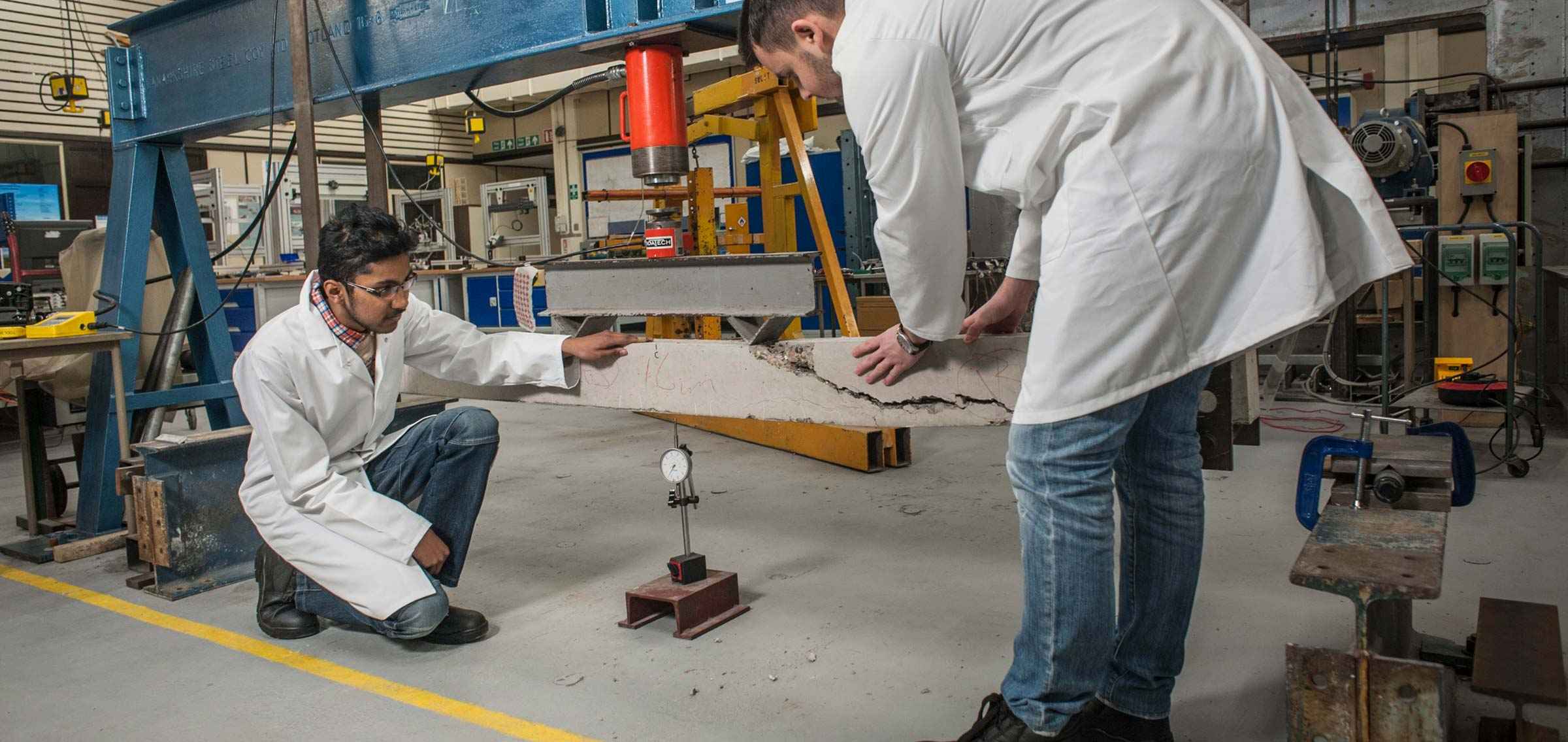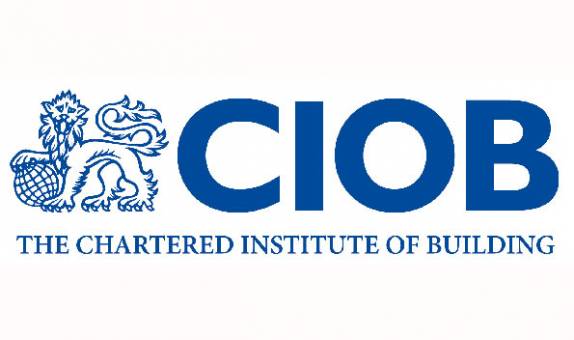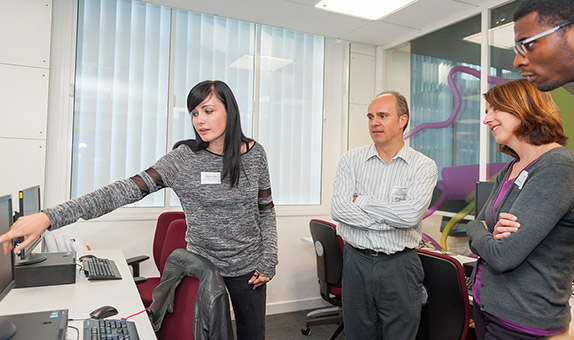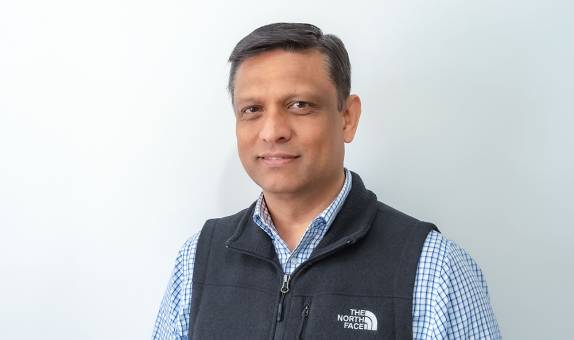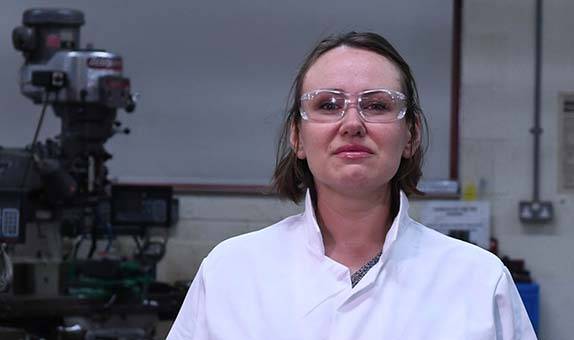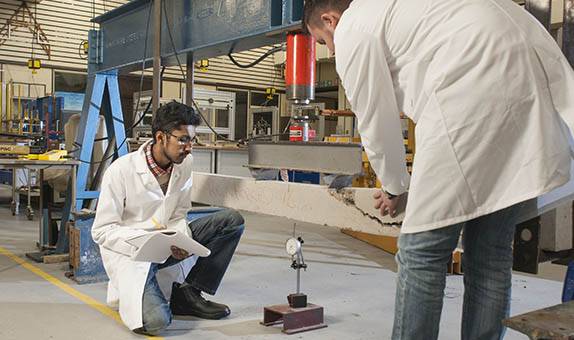Management in Construction MSc
Why choose this course?
This industry-accredited course is suitable for anyone with a background in the built environment who wants to progress into the management of projects, whether with a contractor, client or a consultancy. It combines the study of industry techniques with advanced construction management of projects.
This course provides a strategic overview of construction management issues, as well as a deep and broad knowledge of advanced project management techniques.
You will gain an extensive knowledge of legal and contractual systems relevant to the construction industry, as well as how design and construction work is priced and how these prices are used to control costs within a firm.
You will also focus on the systems used to control the quality and safety measures on a project and how to manage and build relationships between contributing parties working on a project.
Through a research thesis, you will be able to choose an area of specialisation.
| Mode | Duration | Start date |
|---|---|---|
| Full time | 1 year | September 2024 |
| Full time | 1 year |
January 2025 September 2025 |
| Part time | 2 years | September 2024 |
| Part time | 2 years |
January 2025 September 2025 |
| Full time | 2 years including professional placement | September 2024 |
| Full time | 2 years including professional placement |
January 2025 September 2025 |
| Main Location | Penrhyn Road |
Reasons to choose Kingston University
- This course is ideal for graduate construction managers, civil/structural engineers and surveyors looking to start a career in construction management.
- You will study industry techniques and advanced construction project management, developing your professional, analytical and managerial skills.
- This MSc meets the requirements for Further Learning for a Chartered Engineer (CEng) if you already have an Accredited CEng (Partial) BEng (Hons) degree.
Accreditation
Further learning programme - MSc (non-technical)
This course is accredited by the Chartered Institute of Building (CIOB).
Many employers recruit preferentially from accredited degrees, and an accredited degree is likely to be recognised by other countries that are signatories to international accords.
What you will study
You will gain an extensive knowledge of the legal and contractual systems relevant to the construction industry. You will also study how design and construction work is priced and how these prices are used to control the costs for the firms involved. You will analyse the systems that control the quality and safety of construction projects, and will gain a greater understanding of the relationships between the various contributing parties. This course provides a strategic overview of construction management issues as well as a deep and broad knowledge of advanced project management techniques.
For a student to go on placement they are required to pass every module first time with no reassessments. It is the responsibility of individual students to find a suitable paid placement. Students will be supported by our dedicated placement team in securing this opportunity.
Modules
Professional placement
Core modules
Digital Technologies and Construction Modelling
15 credits
This module provides you with an in-depth comprehension in using the Building Information Modelling (BIM) and Construction information Management System (CIMS) in the construction industry. It covers various topics related to BIM and CIMS, including their current application, benefits, challenges in the industry sector, and future developments.
The module will begin by recapping the fundamental concepts of BIM and CIMS, including the evolution of BIM and its importance in the construction industry. It will then delve into the different stages of BIM and CIMS, including modelling, collaboration, documentation, risk management, and collision avoidance and energy efficiency analysis. The module will cover various software tools that are commonly used in BIM and CIMS, such as Autodesk Revit, Navisworks, and BIM 360.
In addition, you will learn how digital construction has revolutionised the construction industry and how BIM and its closely related digital technologies are employed as tools for the realisation of the Construction Industry 4.0.
This module will enable you to apply and evaluate the key principles of BIM, and you will undertake a collaborative interdisciplinary project to apply and develop your skills in a scenario-based group project. The module will discuss the future trends and developments in BIM and CIMS, such as the integration of Artificial Intelligence (AI), Machine Learning (ML), and Virtual Reality (VR) in construction.
Management of Project Risk, Quality and Safety
30 credits
This module starts with a general introduction into the management of projects, and then goes more deeply into the technical aspects of project management techniques and project risk. Risk analysis and the identification and mitigation of risk events are dealt with in a construction project context, including human aspects. It covers many aspects of health and safety legislation and practice, starting from the history of health and safety in the UK, the Health and Safety at Work Act, risk assessment, and covers major sets of regulations that impact on construction work. The Construction (Design and Management) Regulations are dealt with in depth, as this is a key piece of statutory legislation that relates to the construction industry. Good practice and the importance of advice and guidance are emphasised. Quality management is dealt with in relation to the requirements of the latest edition of ISO9000, and the process leading to registration under this standard. Modern Practices in quality and the use of various quality management techniques are covered.
Administration of Construction Contracts
15 credits
This module focuses on equipping you with a comprehensive understanding of the intricate legal issues inherent in construction projects, with an in-depth comprehension into the fundamental legal considerations associated with construction contracts. The module aims to enable you to critically analyse professional liability, assess strategies for expanding or constricting liability, and to appraise the scope of liability beyond the confines of contractual obligations. Furthermore, the module endeavours to provide you with a profound comprehension of matters pertaining to construction disputes, along with an exploration of the frequently employed methods for resolving such disputes, as well as acquiring knowledge on the importance of the law of evidence. The module also accentuates the development of relevant graduate attributes highly sought after in the construction industry, such as collaboration, critical thinking, problem-solving, communication, initiative, and creativity.
Dissertation and Research Business Project
60 credits
Estimating, Tendering and Procurement
30 credits
This module concentrates on the way the construction product is priced and paid for and gives you an understanding of the roles that the client/employer, the main contractors, and the professional service consultants have in relation to the procurement of construction works. It examines the processes undertaken at the senior management level in terms of the estimating and tendering decisions that need to be taken by contractors during the bidding process. It analyses in detail the strategic decision-making rationale that needs to be undertaken in making a decision to tender a bid and the process of turning an estimate into tender submission.
Legal Obligations and Conditions of Contract
credits
In this module you will:
- acquire an understanding of the legal rules governing the law of contract, the law of tort and the administration of the English legal system;
- apply the tort of negligence, duty of care, breach of duty and remoteness of damage; and
- evaluate and critically analyse how a contract is discharged and identify how a contract is performed and breached.
Business in Practice
15 credits
This postgraduate module covers the theory and practice of the business and management needs of aspiring team leaders, managers, and entrepreneurs in business within the context of the scientific, technical, commercial, public, voluntary, or academic sector.
Professional placement
Professional Placement
120 credits
The Professional Placement module is a core module if you're following a masters programme that incorporates an extended professional placement. It provides you with the opportunity to apply your knowledge and skills in an appropriate working environment, and develops and enhances key employability and subject specific skills in your chosen discipline. You may wish to use the placement experience as a platform for a major project or your future career.
It is your responsibility to find and secure a suitable placement opportunity; this should not normally involve more than two placements which must be completed over a minimum period of 10 months and within a maximum of 12 months. The placement must be approved by your Course Leader prior to commencement to ensure its suitability. You will have access to the standard placement preparation activities offered by the Student Engagement and Enhancement (SEE) group.
Read more about the postgraduate work placement scheme.
Work placement scheme
Many postgraduate courses at Kingston University enable students to take the option of a 12-month work placement as part of their course. Although the University supports students in finding a placement and organises events to meet potential employers, the responsibility for finding the work placement is with the student; we cannot guarantee the placement, just the opportunity to undertake it. You may find securing a professional placement difficult as they are highly competitive and challenging, but they are also incredibly rewarding. It is very important to prepare and apply yourself if this is the route you wish to take. Employers look for great written and oral communication skills and an excellent CV/portfolio. As the work placement is an assessed part of the course, it is covered by a student's Student Route visa.
Find out more about the postgraduate work placement scheme.
Entry requirements
Teaching and assessment
Who teaches this course?
The course is taught by the Department of Civil Engineering, Construction and Surveying. Staff have a wide range of experience across research and industry and continue to practice and research at the cutting edge of their discipline.
Our programmes have been designed with your aspirations, needs and abilities in mind, and are aimed at developing your specialist skills, deepening your understanding and gaining new insights and perspectives to equip you for a professional career ahead.
Academic staff in the department are bonded in an interdisciplinary team of civil and structural engineers, material scientists, geologists, hydrologists, construction managers, building and quantity surveyors with professional practice and applied research backgrounds. Many of us are nationally and internationally recognised leaders in our areas of specialism and we are frequently invited to undertake high-profile external research and consultancy work.
Having developed our courses with the working world in mind, we offer hands-on student experiences such as testing in our exemplary laboratory facilities in structures, materials, concrete, geotechnics and hydraulics that are used for teaching and research. Knowledge is also gained from field trips for both undergraduates and postgraduates; site visits and industrial placements; employability support via our strong partnerships with industry, professional institutions and learned societies.
Our teaching is engaging and practice-focused and supported by site visits and invited guest lecturers by our industrial liaisons and strong alumni network. Our approach to assessment is project-driven and seeks to equip students with a range of competencies and transferrable skills thus boosting their employability prospects.
Postgraduate students may run or assist in lab sessions and may also contribute to the teaching of seminars under the supervision of the module leader.
Fees for this course
Additional costs
Depending on the programme of study, there may be extra costs that are not covered by tuition fees which students will need to consider when planning their studies. Tuition fees cover the cost of your teaching, assessment and operating University facilities such as the library, access to shared IT equipment and other support services. Accommodation and living costs are not included in our fees. Where a course has additional expenses, we make every effort to highlight them. These may include optional field trips, materials (e.g. art, design, engineering), security checks such as DBS, uniforms, specialist clothing or professional memberships.
Facilities
There is a wide range of facilities for practical work at our Penrhyn Road campus, where this course is based. You will have access to a modern environment with the latest technology and industry-standard equipment, including:
- extensive materials and structures facility for concrete, masonry, steel and timber;
- geotechnical and hydraulics testing facilities; and
- surveying equipment, such as satellite global-positioning systems.
Dedicated computer-aided design facilities include:
- a range of CAD/CAM packages, such as Ideas, SolidWorks and AutoCad;
- finite element analysis‚ computational fluid dynamics; and
- virtual instrumentation.
You can also use the dedicated Graduate Centre on campus. This includes:
- IT facilities;
- seminar rooms;
- social spaces and a canteen; and
- a learning resource centre with specialist libraries.
Students studying this course will benefit from the John Galsworthy Building, a £20million teaching and learning facility, which opened in November 2007. The six-storey complex brings lecture theatres, flexible teaching space and information technology suites together around a landscaped courtyard.
After you graduate
You will graduate prepared for roles such as construction manager, housing contracts manager, quality surveyor and transport consultant, in both the private and public sector. Examples of recent graduate destinations for this and similar courses include:
- civil engineer at Razonras, Greece
- civil engineer at Terna, Greece
- housing contracts manager at Lewes District Council, Lewes
- quality surveyor at KIA Seldon, London
- transport consultant at Halcrow, London.
Careers and recruitment advice
The Faculty has a specialist employability team. It provides friendly and high-quality careers and recruitment guidance, including advice and sessions on job-seeking skills such as CV preparation, application forms and interview techniques. Specific advice is also available for international students about the UK job market and employers' expectations and requirements. The team runs employer events throughout the year, including job fairs, key speakers from industry and interviews on campus. These events give you the opportunity to hear from, and network with, employers in an informal setting.
What our graduates say
What this course offers you
- The Management in Construction course provides a deep understanding of construction management issues.
- It will develop your professional, analytical and management skills, as well as improving your technical skills and knowledge. For example, you will gain communication, teamwork, IT and problem-solving skills.
- Each module combines a stimulating mix of lectures, practical laboratory work, group work, case studies and presentations.
- Your research thesis allows you to build on your academic knowledge and extend your in-depth knowledge in your area of specialisation. It can be an excellent selling point when looking for a job or promotion.
- You can choose to study the course full-time or part-time to fit in with work commitments. September and January start dates give you extra flexibility.
- We regularly review all our postgraduate courses to make sure that they are up-to-date, reflect industry needs and are comparable to other university courses.
Research areas
Engineering research
Many academic staff are engaged in a range of research and consultancy activities funded by the Research Councils, the European Union, the government, trade unions and industry. These activities ensure our staff are in touch with the latest industry thinking and bring best practice to your studies.
Research centres
Engineering research is organised into three research centres, which provide focus and encourage the cross-fertilisation of ideas.
Civil engineering and construction research takes place in the Sustainable Technology Research Centre. The research groups within the centre cover a wide range of topics, including:
- land use
- building design and construction
- re-cycling waste materials
- efficient energy use and distribution
- water resources (hydraulics)
- monitoring using remote sensing.
Course changes and regulations
The information on this page reflects the currently intended course structure and module details. To improve your student experience and the quality of your degree, we may review and change the material information of this course. Course changes explained.
Programme Specifications for the course are published ahead of each academic year.
Regulations governing this course can be found on our website.
